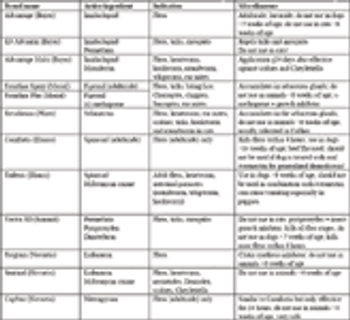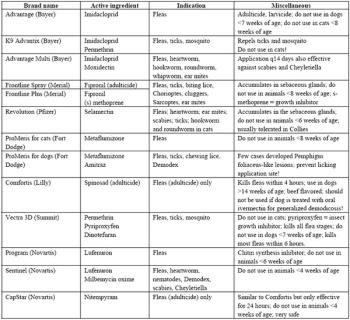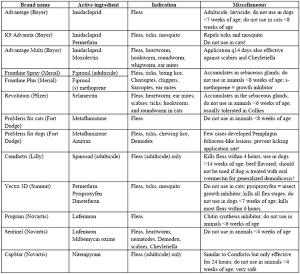
Veterinary dermatologist Dr. Patrick Hensel presents some of the newer drugs at your disposal.
Department of Small Animal Medicine and Surgery
College of Veterinary Medicine
University of Georgia
Athens, GA 30602

Veterinary dermatologist Dr. Patrick Hensel presents some of the newer drugs at your disposal.

In the field of veterinary medicine we see a constant search for newer, more effective, and convenient but inexpensive drugs with lesser side effects. Not only new drugs are interesting, but old drugs are occasionally rediscovered for new indications.

Topical therapy is an important symptomatic and complimentary treatment option in the management of various skin diseases. Canine skin is often more sensitive than is human skin due to anatomical and physiological differences, including differences in the thickness of the stratum corneum, skin pH and hair follicle density which can facilitate cutaneous penetration of active ingredients.

Canine pyoderma is a common secondary problem, a leading cause of antibiotic use in dogs, and an often frustrating problem for vets and pet owners alike. Unlike many other types of infections, skin infections are often recurrent. This frequently leads to an ongoing cycle of being on and off of antibiotics.

Pustules, crusts and epidermal collarettes are superficial skin lesions which are often seen in association with superficial pyoderma. Although in such situations a pyoderma is the most likely diagnosis and antibiotic therapy is justified, other diseases should be considered, especially after poor response to initial therapy.

Fleas are still the most common cause for parasite induced pruritic skin problems in many geographical regions. Since the nineteen's many different drugs and preventative have been introduced to prevent and to treat flea infestation, and certainly the occurrence of severe widespread infestations have declined. However, the lack of pet owner compliance and neglect of addressing environmental flea ainfestation are probably the most common causes for a chronic recurring flea problem.

Skin and ear problems are very common reasons for dogs and cats being presented to a veterinarian. These animals can suffer from many different skin diseases with a wide range of underlying causes. Because the skin has a limited range to react to the different insults a straight-forward diagnosis is commonly not possible, especially in patients with chronic skin diseases.

Canine otitis externa is certainly one of the most common problems veterinarians are dealing with in small animal practice. However, recurrent ear diseases can be very challenging to manage and be quite frustrating for the practitioner as well as for the pet owner.

Dogs and cats are often presented with a complaint of scratching and chewing resulting self-inflicted trauma. Pruritus is a very unspecific clinical sign which can be caused by many different problems such as various ectoparasites, microbial infections and a wide range of hypersensitivities.

In the field of veterinary medicine we see a constant search for newer, more effective, and convenient but inexpensive drugs with lesser side effects. Not only new drugs are interesting, but old drugs are occasionally rediscovered for new indications.

Fleas are still the most common cause for parasite induced pruritic skin problems. Since the nineteen's many different drugs and preventative have been introduced to prevent and to treat flea infestation, and certainly the occurrence of severe widespread infestations have declined.

Skin and ear problems are very common reasons for dogs and cats being presented to a veterinarian. These animals can suffer from many different skin diseases with a wide range of underlying causes.

Concurrent claw problems are not unusual in many skin diseases, but rare as the only dermatological problem. The most common disease affecting single claws are: trauma, bacterial or fungal infections; the most common condition affecting multiple claws would be onychodystrophy.

The most common hypersensitivities affecting dogs and cats are: flea bite hypersensitivity, food adverse reaction (food allergy & food intolerance), and atopy.

Published: December 1st 2011 | Updated:

Published: April 1st 2010 | Updated:

Published: April 1st 2010 | Updated:

Published: April 1st 2010 | Updated:

Published: April 1st 2010 | Updated:

Published: April 1st 2010 | Updated: